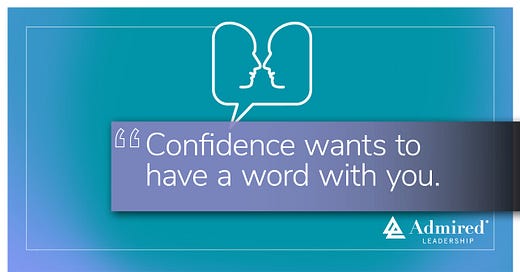Confidence wants to have a word with you.
It wants to tell you that it springs more from insight than from personality, more from failure than from winning. In fact, the more you fail, the more confidence you build when you struggle through that failure and eventually master the task or performance.
The willingness to tackle a task with the likelihood you might bomb is not tied to your personality or biology. It is a learned behavior from your formative years.
As we grow and mature as young adults, we learn that failure is commonplace and inevitable. We all fall on our faces. A lot. Some of us dislike the embarrassment, teasing, and discomfort of failing so much that we will do just about anything to avoid it. We won’t take the chance not to succeed. We rarely put ourselves into the line of fire. Playing it safe means not developing the most important ingredient to self-confidence: resilience.
The truth is, confident people generally fail more than others. In their attempt to learn a new skill, they get pushed down, kicked in the face, and laughed at, just like everyone else. But they get up and learn for themselves how resilient they really are. They recover from the setbacks and come to believe they are stronger, not weaker, for the disgrace.
Confident people push through, take action, and eventually master new skills. This is when the belief in our own abilities begins to grow. Ironically, the more we struggle, the more we learn the same lesson — over and over. We can learn and excel at just about anything over time.
The confidence we derive from our challenges allows us to step forward boldly and break the shackles of whatever might hold us back the next time. We become confident on the shoulders of the stumbles and missteps others find debilitating. The more we experience and survive the big disappointments and failures, the more we realize how much we can handle. Our confidence grows.
In the end, we learn we are only as good as we are willing to be bad. By taking the risk to do poorly, confidence is born.





We need to do a better job of trying to discern between confidence and competence. We love charismatic people, and we tend to assume that confident, charismatic people are automatically more competent. This is not always the case.
In the week I've been a subscriber this has been my favorite one. Lot of great, visual stirring phrases in this one. Humble and practice were two things that kept coming to mind while reading this. Also, makes me think of something I heard from Dan Sullivan I believe while listening to audio version of "The Gap and The Gain":
"There’s not winning and losing. There’s winning and learning."